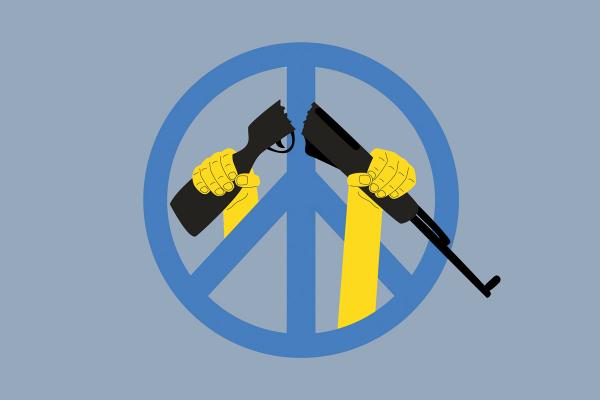THE NUMBER OF asylum seekers from Russia arriving at the U.S. southern border has risen dramatically in the past year. Hundreds of thousands of Russians have left their homeland since President Putin ordered the invasion of Ukraine. Some fear increasing economic hardship and that Putin will impose martial law and close the borders, and some are fleeing to follow their conscience.
In September, the Kremlin announced its first military mobilization for soldiers to fight in Ukraine, prompting the departure of tens of thousands of Russian men. A second mobilization may occur this fall. Many of those who have fled hold religious or moral beliefs that tell them that participation in Russia’s invasion of Ukraine is wrong. Many young men have come to the United States seeking asylum as conscientious objectors (COs) based on their refusal to be drafted into Russia’s military for reasons of moral conscience.
At the Center on Conscience and War, we began hearing about these cases in fall 2022 — and found very few resources to support them. A handful of immigration attorneys are taking on a few of these cases, but the demand is much greater than the help available. This spring, our center initiated a Freedom of Information Act request to learn exactly how many of the asylum seekers are making claims based on conscientious objection to military conscription.
Individuals from Russia, Belarus, and elsewhere are refusing to fight in the war against Ukraine. During the first year, the Biden administration had a policy of not deporting asylum seekers back to Russia, Ukraine, Belarus, or six other countries bearing the brunt of the humanitarian crisis caused by Russia’s invasion. However, this March, the U.S. resumed deportations. The first person sent back to Russia was a conscientious objector fleeing the draft; he had made his asylum claim based on his religious and ethical beliefs against war. In what appears to be an incorrect application of U.S. asylum law regarding conscription, his claim was denied.
Days after the first one, another CO was scheduled for deportation. The second young man was taken to the airport by immigration agents in Louisiana where, in an act of staggering courage and resolve, he refused to board the plane. At the time of this writing, he remains in detention in Louisiana, awaiting judicial review of his case. Other COs are currently in detention and facing deportation.
In accord with international law
AFTER LEARNING ABOUT these cases, the Center on Conscience and War began an appeal to the Biden administration and Congress to halt further deportations to Russia, Belarus, and Ukraine and to review Department of Homeland Security policies and procedures to ensure that asylum officers receive proper training on “credible fear” claims based on issues of military conscription.
This should be an easy one: It is morally wrong to compel someone to be drafted to fight and kill in war. But U.S. asylum law affirms the right of a sovereign nation to draft its people for military service. In other words, an asylum claim that appears to be based on refusing your country’s draft does not meet the standard for gaining asylum. However, an asylum claim based on a religious or moral objection to war does meet the standard for asylum.
U.S. law also provides for asylum claims when the basis is to resist forced participation in war crimes. In March, the International Criminal Court issued an arrest warrant for Vladimir Putin for war crimes committed against Ukraine; thus, anyone seeking asylum to avoid conscription is acting in accordance with international law.
Exercising moral agency
SO WHY ARE these men, whose claims are clearly in alignment with the law, facing deportation? In our work with COs in other circumstances, we have found that U.S. officials often are very poorly trained on CO law and policy. Conscientious objectors know their own beliefs and where their conscience is leading them, but they often do not understand the law or policy. In the case of Russian asylum seekers, there is the additional hurdle of lack of access to Russian-English translators. Some cases have been denied simply because the CO missed a deadline. COs have a much greater chance of a successful claim when they have an advocate.
While the U.S. doesn’t have an active draft, we are called to be vigilant in defending the right to conscientious objection under the law anywhere it is actively in practice today. This includes the U.S. Department of Defense, through its policy of discharging military COs, and Homeland Security, through its immigration and citizenship policies.
Conscientious objectors are often told they have the right to be conscientious objectors to war only because the military fights to secure that right. Anyone who has been through a process to document a conscientious objection claim knows that the opposite is true. We have enforceable protection for conscience in this country and in other parts of the world because of courageous acts and sacrifices made by conscientious objectors throughout history.
Protecting the rights of COs, current and future, includes guaranteeing them the right to due process. When asylum seekers flee involuntary military conscription that violates their conscience, they exercise their moral agency as human beings.
As the war rages on in Ukraine, we have seen the ongoing struggle for recognition of the right to conscientious objection. The draft resisters fleeing Russia are incredibly brave. Their sacrifice is almost unfathomable to us in the United States. For generations, we have not faced a military draft. We have not had to ask ourselves how committed we are to the values of peace or what we are willing to risk to remain true to those values. Russian COs are bearing that burden for all of us right now by testing U.S. laws and policies on conscientious objection. Our moral and religious traditions compel us to stand with them.

Got something to say about what you're reading? We value your feedback!






